AiW Guest: Carli Coetzee
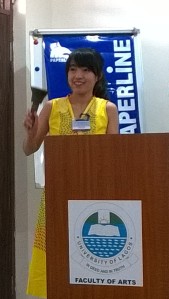 The second conference of the Lagos Studies Association has just taken place, at the University of Lagos. The conference had many memorable moments, but the one that stands out for me was when the panel was interrupted and punctuated by a performance. The panel, called “Nollywood and Theatre: Expressive Culture and Performance on Stage and on Screen” followed the pattern well known at academic conferences: panellists sat at the high table, and took turns to talk about their research, after which the audience would get to ask questions. Dr Ying Cheng of Peking University broke with convention by standing up and leaving the high table, and started ringing a large hand bell. After what felt like several minutes when we in the audience were not quite sure what to expect, the door opened and three performers from Illuminate Theatre entered the conference room.
The second conference of the Lagos Studies Association has just taken place, at the University of Lagos. The conference had many memorable moments, but the one that stands out for me was when the panel was interrupted and punctuated by a performance. The panel, called “Nollywood and Theatre: Expressive Culture and Performance on Stage and on Screen” followed the pattern well known at academic conferences: panellists sat at the high table, and took turns to talk about their research, after which the audience would get to ask questions. Dr Ying Cheng of Peking University broke with convention by standing up and leaving the high table, and started ringing a large hand bell. After what felt like several minutes when we in the audience were not quite sure what to expect, the door opened and three performers from Illuminate Theatre entered the conference room.
The performers’ entrance into the room unsettled the conventions of academic conferences in a number of ways. The invasion of the lecture room already broke with the protocols of academic behaviour. More unsettling was the way the performers moved around the room, locking their gaze on individuals and forcing us to look into their eyes. They never used language to express themselves. Instead the language of their agile and athletic bodies brought us scholars out of ourselves to confront realities beyond the clean, air-conditioned room and beyond our medium – language and intellectual discourse.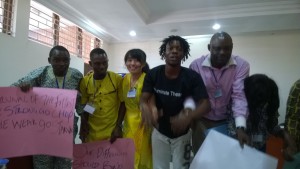
The paper Dr Cheng had presented was called “Mi Ò Ní Choice: Performing the Arts of Citizenship in Lagos”. The linked performance was a commentary on and archive of Occupy Nigeria, and the performers had prepared a series of large A2 size pieces of paper with slogans and words written on them (for example SURVIVAL OF THE FITTEST. THE STRONG GO CHOP THE WEAK GO STARVE). One of the performers started taping these to the wall, when a Professor from the University of Lagos Theatre Arts Department (Prof Cornelius Onyekaba) decided to join the performance, and soon each placard was held by a line of academics who thus became participants in the performance piece. Prof Onyekaba intervened because there was limited time, but he also understood clearly that the performance required of the audience to arrest the passivity of our bodies, and to imagine worlds of activism and engagement that went beyond the conference venue. The performers remained in the room for question time, sitting on a row of chairs to the side of the room, nodding or shaking their heads to the rest of the presentations.
Their presence reminded us that what we do in the classroom and in the conference venue is, and necessarily needs to be, connected to the forms of activism outside the classroom. Their performance interrupted the expectations of what academic scholarship is, and through their hauntingly physical and non-verbal dance performance they encouraged us to imagine another, more human, world to come. In that better future, I hope that all conference panels will require that activist performers take part, unsettle certainties and challenge us to look more incisively at what it is we are doing.
 Carli Coetzee is a South African born academic living and working in the UK. Her book Accented Futures: Language Activism and the Ending of Apartheid appeared in 2013, and she is the co-editor of the collection Negotiating the Past: The Making of Memory in South Africa. Her current project is on blood and secrets. She is the editor of the Journal of African Cultural Studies.
Carli Coetzee is a South African born academic living and working in the UK. Her book Accented Futures: Language Activism and the Ending of Apartheid appeared in 2013, and she is the co-editor of the collection Negotiating the Past: The Making of Memory in South Africa. Her current project is on blood and secrets. She is the editor of the Journal of African Cultural Studies.
Categories: Research, Studies, Teaching
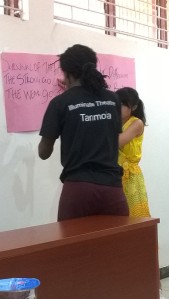
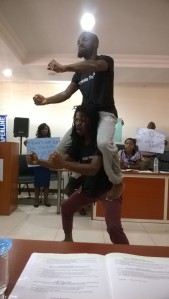
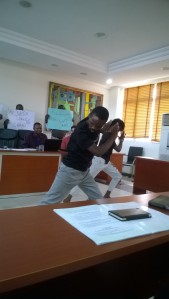
 Review: Tragedy and Resilience in Lagos – The Truth About Sadia by Lola Akande
Review: Tragedy and Resilience in Lagos – The Truth About Sadia by Lola Akande  Reviews: ‘Everyday life’ — Karin Barber’s A History of African Popular Culture (2018)
Reviews: ‘Everyday life’ — Karin Barber’s A History of African Popular Culture (2018)  Q&A: Eyob Derillo– Literatures of the Horn of Africa, a conversation series
Q&A: Eyob Derillo– Literatures of the Horn of Africa, a conversation series  Q&A: Professor Ghirmai Negash – Literatures of the Horn of Africa, a conversation series
Q&A: Professor Ghirmai Negash – Literatures of the Horn of Africa, a conversation series
Thank you carli coetzee for this review. We can always do more. Visit our page on Facebook and Instagram at illuminatetheatre for more updates .